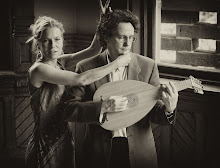Here's the program for the Hail Bishop Valentine Concert, 7:30PM, Feb. 12, 2013, Charbonnel Lounge, St. Michael’s College, 81 St. Mary Street. Come one, come all.
Preludium John Dowland (1563-1626)
Excerpt from 'The life and death of our late most incomparable and heroique prince, Henry Prince of Wales by Sir Charles Cornwallis
So parted you John Coprario (c. 1570-1626)
The Prince his Almayne Robert Johnson (c.1583-1634)
 |
| John Donne |
Come away, come sweet love Dowland
The Lady Elyza: her masque Johnson
Epithalamion Stanza 2
When Laura smiles Philip Rosseter (1567-1623)
Solus cum Sola Dowland
Epithalamion Stanza 3
Sweet stay awhile Dowland
Delyght Pavan John Johnson (c1545-94)
Epithalamion Stanza 4
Deare, if you change Dowland
Delyght Gallyard John Johnson
Epithalamion Stanza 5
Cleare of cloudie Dowland
Nowe to bed Anon.
Epithalamion Stanza 6
Time stands still Dowland
My Hart is Surely Sett Anon.
Epithalamion Stanza 7
Faine would I wed Campion
Greensleeves Francis Cutting (c.1550-1596)
Epithalamion Stanza 8
There is a Garden in her face Robert Jones (1577-1617)
George V, grandad of Elizabeth II, from the House of Windsor, and Charles I, brother of
Princess Elizabeth of the House of Stuart. Family resemblance?
‘I may be uninspiring, but I’ll be damned if I’m alien!’ British King George V is supposed to have said in response to H.G. Wells’s criticism of the royal lack of charisma and excess of Germanness. The charisma problem was all George’s own, but we can pinpoint the source of the latter.
The first ‘British’ king, James VI of Scotland, inherited the English Tudor crown and soon set about marrying off his children to various continental dynasties to cement his ‘prince of peace’ policy. As you will hear in the reading from the Cornwallis letter, James’s daughter Elizabeth was matched with various princes, but public opinion, and particularly that of her brother Henry, Prince of Wales, settled on Frederick, Elector Palatine, who Cornwallis calls by another of his titles ‘The Palsgrave’. The sickly Henry died after a vigorous game of tennis with Frederick in October 1612. We present a song, words by Campion, music by Coprario, from the point of view of Elizabeth on that tragedy.
The official commemorative poem of the Royal Wedding of Valentine’s Day, 1613 was by John Donne, which you hear tonight read in the pronunciation of the time. Donne and Campion (his texts are heard here set by Jones, Rosseter and himself as well) seem to have competed as the official court mouthpieces. Between the verses of Donne’s wedding poem we sing some love songs of the period untouched by the cruel disdain of the harsh mistresses that breaks the hearts of so many poets and songwriters in that age of melancholy, along with some lute pieces the titles of which might allude to the delights of new love.
And about the Germanness: Frederick and Elizabeth’s grandson came to the British throne, not speaking a word of English, as George I, of the House of Hanover and his great-great-granddaughter Victoria still spoke German around the house. Public opinion in WWI forced George V to adopt the last name Windsor and lose the German sounding ‘House of Saxe-Coburg and Gotha’ handle. God Save the Queen.


.jpg)


No comments:
Post a Comment